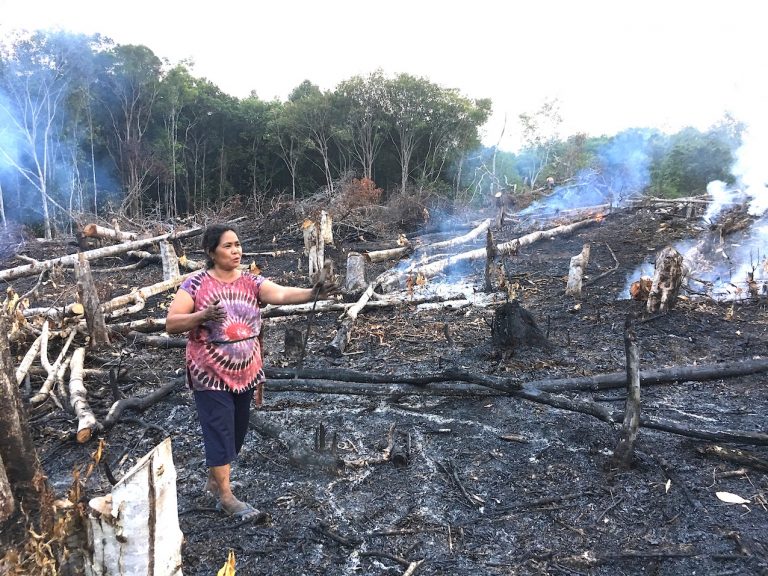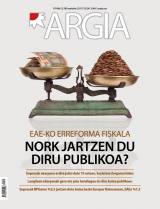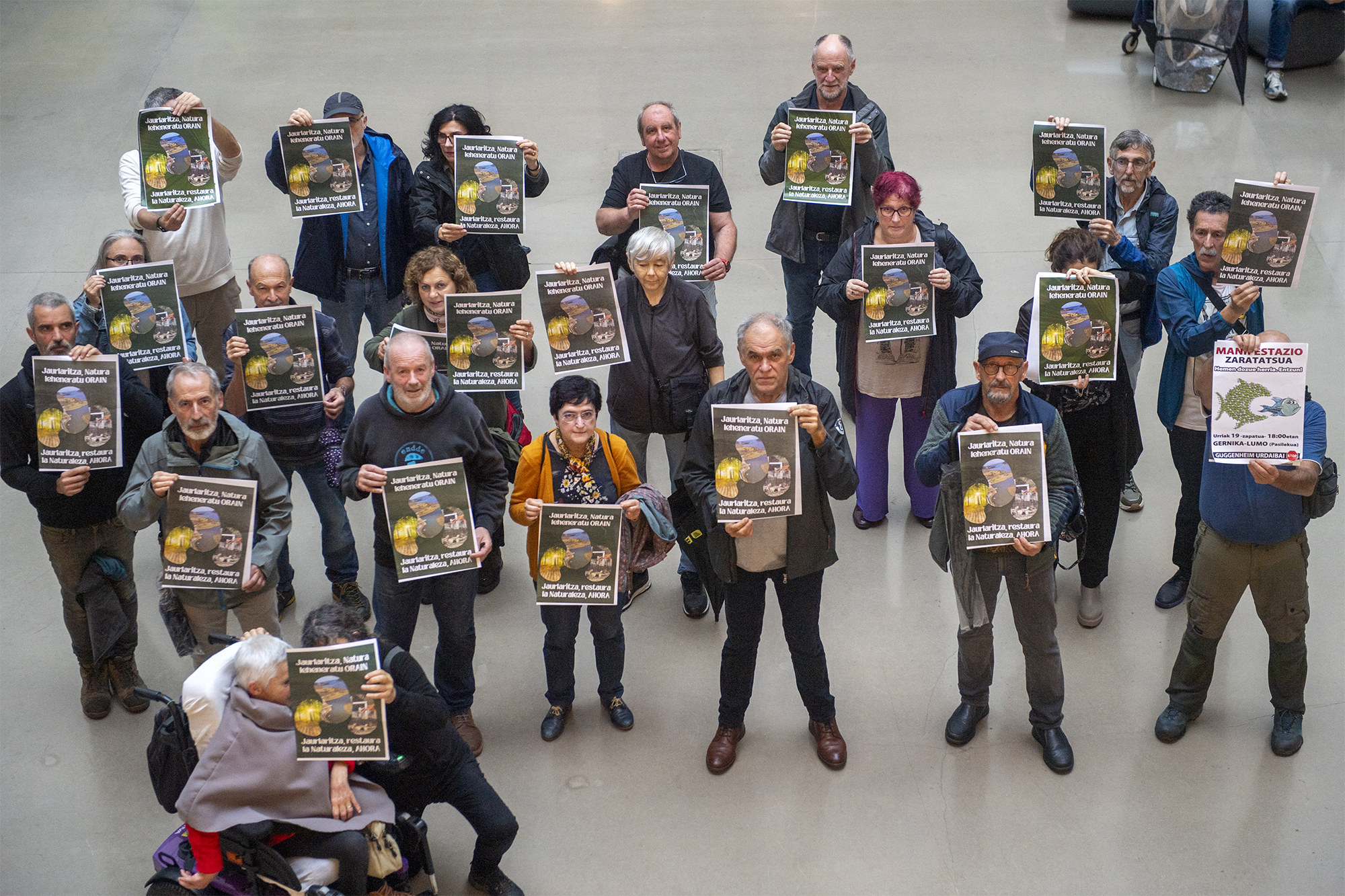Borneo is burned and it takes a journalist to explain the ugly truth.
- The journalist André Vltch, who has known the ARGIA reader at the LARRUN (Ecology of War) supplement in November, rolls on the island of Borneo the documentary that will be the chronicle of one of the world’s largest destroys. The Western multinationals have destroyed the social fabric as the rich ecosystem of Borneo, bringing down the entire jungle and dumping soils in search of minerals on the gigantic island until recently havens of biodiversity.

After Greenland and New Guinea, Borneo is the third largest island on the planet, with 743,000 square kilometres (Spain has 505,000), with 16 million inhabitants. Indonesia owns two thirds and Malaysia the remaining third, leaving Brunei sultanate a small end. To explain why André Vltch is obsessed with Borneo, it is best to repeat here a passage from the chronicle “Borneo, the destroyed island, in the ignorance of the people” which he published in November in the Usan’Action medium. Here.
“And the island is burning. There are appalling chemical emissions everywhere. They look for gold illegally, both in the underground and in the midst of large and ugly contaminated streams; excavations are easily visible from the air and on the earth’s surface, but are monitored by ‘powerful’, as well as by the armed forces, so they are untouchable.
Today, Borneo means digging for mines and felling trees, as well as imposing plantations of trees that have already cannibalized most of the territory. Nothing is produced here, but it is extracted from everything and extracted.
People are losing their land. They lose their health and also their lives. The planet is losing its lungs – the tropical rainforests – or, more precisely, it has already lost the ones it had in this archipelago. Savage capitalism, moral and financial corruption, the uncontrolled multinationals; it is the horrible truth, the terrible truth of this country that is completely lost in its course.
It looks like Borneo is at the end. Indonesia as a whole is the one that has come to the end of the game, but it seems that it is politically ugly to say that in the West, especially in the mainstream media. Indonesia, after all, is being destroyed to enrich the West. This was the case in the era of colonialism, and this has been the case again since the military in 1965 gave the coup d'état promoted by the United States.
I also work in Afghanistan, in a number of countries in the Middle East and Africa that have completely collapsed. Here, on the Borneo, everything works the same way there. Is peace what they live here? I don't think so. For me it's like a war, a terribly violent war. It looks like a war of nations against their people, a war of nations against nature and all creatures, a war against forests, streams and even life itself.
It looks like a neo-colonial nightmare. What was the most beautiful place in Asia is calcined, full of scars and tormented. But if she still breathes, she's alive. And it’s always worth fighting for what lives.”
André Vltchek (1962), journalist and documentalist, was born in Leningrad – today in St. Petersburg, Russia. The American, of nationality, is known for his chronicles published in small media, as well as for his books. In the Basque Country, the Txalaparta published in Spanish the Western terrorism with Noam Chomsky. He has also produced a series of documentaries on the war in Rwanda and Congo and others.
Last spring of winter he sent beautiful chronicles of Afghanistan. But in recent years it has focused on East Asia, as well as Cambodia, Indonesia. He writes about the bankruptcy of this country “Indonesia, an archipelago of fear.” However, Vltch appears that the destruction he saw on his last trip to Borneo shook him as a shock and so he has decided to make a special force to show him his chronicles and images.
Who remembers Sukarno
Vltch, who knows the remote region of Asia well, does not expect anyone to dare to tell the forgotten hell of the place. Although tourists who travel to the so-called Indonesian havens have no idea of this, they live there a peace drowned by the blood of thousands of slaughtered citizens. Since General Suharto took power in 1965, with the exception of Sukarno, who was then the president and reference of the progressive leaders of the Third World, he paid half a million deaths and one and a half million incarcerations to control Western Indonesia.
Now, says Vltchek, the elite is as served as in the worst times of colonialism in Europe and the United States. Education does nothing but brainwashing [brain washing] of children and young people, in the world of culture writers and filmmakers produce trash that wants to copy the Western style, there are no voices that denounce the desmanes of capital in the environment as in society. Buried by the power of Communism in the 1960s, many citizens have taken refuge in fundamentalisms, whether Christian or Muslim. In this regard, Vltchek believes that the Western powers have created a second Middle East in that Far East.
But there are also people in Borneo. Vltch presents us in his chronicles to the people who have to live. Those who suffer for understanding what has happened to them, those who show them details of the disaster. But also those who have adapted to the new situation, burning the last trees in the forests and with rubber or in search of minerals, who want to do a business that allows them to live, who do not mind that things can be otherwise.
Mrs Bu Elvi, for example, has found her family smoking a rubber forest in the Sintang region. There, torn down the rainforest a long time ago, the family worked a small rubber sketch, but apparently – Elvik is following the raw material bag by the media – rubber is not profitable at this time, with low prices and government subsidies. Outside the rubber trees and something else.
But who is going to say that Elvi is wrong? Since Suharto, everyone has complied with the promises made to the peasants, fulfilling what the globalised economy has asked of the farmers of the Far East. After hard work he earns money and can proudly proclaim that he lives in possession of himself without having to beg anyone. Bu Elvi is one of the new Indonesians the authorities wanted.
Vltchek asks readers for help in leading the new documentary. “Here I’m working at Borneo: rolling, writing, taking pictures. There are those who support me and strive to help. Will we achieve something? I would like to do so. We have to get it, because if not, they will soon privatize it, market it and perhaps destroy everything here and everywhere.”
On 9 June, the Deputy General of the Provincial Council of Gipuzkoa, Markel Olano, and the Deputy for Economic Promotion, Tourism and the Rural Environment, Jabier Larrañaga, appeared in Donostia to present the Basotik Foundation. The director general of Montes y Medio Natural,... [+]
Would anyone say that the Amazon rainforest is an abandoned forest? Or that the protected areas of Costa Rica and Borneo are abandoned? Have we declared natural parks because Pagoeta and Aiako Harria are abandoned forests? In all these areas is the natural forest or the natural... [+]






















